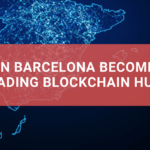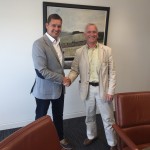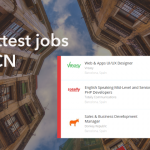Last Tuesday, the Barcelona Internet Startups (BIS) group hosted their final major event of 2013 at Garrigues Law with a presentation from entrepreneur Michael Wolfe titled Quitting, Sucking, and Failing Your Way to a Better Life.
In front of a packed international audience, Wolfe shared his first-hand insights as a serial entrepreneur and founder in Silicon Valley and his personal journey in 3 successful exits. The presentation focused on the world of startups as a career choice, addressing the questions of whether and how to embark on such a career and what to expect. It was followed by a lively Q&A session.
Upon completion of his studies at Stanford University, Wolfe began his working life at Goldman Sachs, before embarking on a career in startups. He started his first startup in college in 1988 and been a founder or early employee at four separate startups: Vontu, Kana, I/PRO and Pipewise. After raising hundreds of millions of dollars in capital, two stints as Entrepreneur in Residence at Benchmark Capital and teaching at Stanford University, Wolfe is currently on a year-long sabbatical in Barcelona. He remains highly involved with the startup community.
The reality of a career in startups, Wolfe began, is far messier than the idealised trajectory commonly represented in mainstream media. The pathway of founding, raising venture capital, going viral, selling and getting rich almost never happens. There is no clear formula of success, which means that no Venture Capitalist or founder can reliably predict winners.
Some of the common problems encountered when founding a startup are a result of this. Founders are doing something without precedence. In addition, the initial lack of staff forces everyone to do everything, which can mean founders creating code and engineers making sales calls.
This chaos only begins to subside when the influx of venture capital enables additional recruitment. At this point, good recruitment is essential. Founders must learn people management, as startups rarely inherit teams, they have to build them. Staff must be great at something, and generalists struggle. Wolfe highlighted the model of a ‘T-shaped person’, with a breadth of diverse ability but depth in one area. The industry has a high turnover of staff. The ideal combination, Wolfe believes, is one of low voluntary turnover and aggressive involuntary turnover when required.
Wolfe reinforced the belief that one should always start a company in a recession and never in a boom. Entrepreneurs want to start when things are rock bottom, where there is less competition and marketing and staff are cheaper, and ride the wave through the growth. He himself founded a startup the day following 9/11.
A lot of success, Wolfe believes, is down to timing, both in terms of the economy and also technology. Entrepreneurs must therefore live in the future, avoid scepticism and stay abreast of developments. A degree of bravery is also required; entrepreneurs must be willing to jump into something, to quit and to move on. Wolfe speaks from experience. While quitting through necessity is easy, leaving a stable position is more difficult. Leaving his position at Goldman Sachs led to Wolfe’s life in startups.
Rarely does the first startup succeed, Wolfe explained. Mark Zuckerberg, Bill Gates and Steve Jobs all endured failures prior to their celebrated successes. Failure must be destigmatised. Events such as FailCon, which visited Barcelona this summer, are helping to do this. One of Wolfe’s own companies failed, he explained, and all came close.
[slideshare id=20203557&doc=failconzurich-130429122101-phpapp02&w=650&h=500]
Startups should be seen not as a one-off plan, but as a career, albeit a “career in chunks”, in which a year of failure can precede five years of success which can enable long breaks in an industry Wolfe describes as “volatile by nature”. The drama of uncertainty, the energy of the environment and the constant learning are all benefits of this volatility. Passion for this working culture, he argued, is more important than financial motivations. Most successful entrepreneurs don’t show their money off, they invest it in new ventures. MBA graduates viewing startups as an alternative to Wall Street rarely succeed.
The traditional model of a clear authority, known problems and defined criteria indoctrinated into us by parents, education and work doesn’t apply to startups, Wolfe explained. The customer and market are unknown, teams small and inexperienced and solutions found through trial and error. “Venture capitalists,” Wolfe elaborates, “fill the vacuum created by the assumption that someone must be in charge.”
Those tempted by a career in startups were advised to start now. It only becomes harder with age, as experience is required and multiple attempts normally preceding success. Furthermore, the industry has an undeniable age bias. But founding a startup is not the only option; you can also join one.
Wolfe believes that too many entrepreneurs chase consumer-web solutions rather than B2B. The tech press is skewed towards consumer solutions due to the interests of their readers, but B2B is more successful than the coverage suggests. And it’s growing. While B2B startups may make more moderate exits in general, their averages are better.
The value of incubators was discussed. Wolfe feel thats there are now too many incubators and that their benefits vary. He argued that they should be seen as accelerators, rather than enablers. Entrepreneurs should be willing to pursue their idea either with or without them.
As for Barcelona’s potential as a startup hub, Wolfe admitted that major investors generally want companies to move their headquarters to Silicon Valley after raising venture capital. Labour laws play a factor; Wolfe’s ideal of “hire at will, fire at will” is incompatible with Spanish legal requirements. But companies can be split, and Barcelona has competitive advantages it can take benefit of. And raising investment in the city is certainly possible. The economic crisis has led to hardship, but also opportunities. As event organiser Jeff Robinson added: “Money is everywhere in the world. Money moves. Buy and do when others won’t. The opportunity will leave Spain before too long.








Leave a Reply